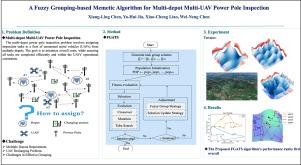A fuzzy grouping-based memetic algorithm for multi-depot multi-UAV power pole inspection
IF 6.6
1区 计算机科学
Q1 COMPUTER SCIENCE, ARTIFICIAL INTELLIGENCE
引用次数: 0
Abstract
Power pole inspection is important to maintain the normal operation of electrical system. It usually requires to fly a fleet of unmanned aerial vehicles (UAVs) from multiple depots at the same time to jointly complete the inspection tasks distributed in a wide area, which is a challenging planning problem. In order to address this problem, this work first builds the model of the multi-depot multi-UAV power pole inspection problem with charging stations. After that, a fuzzy grouping-based memetic algorithm named FGATS is proposed to solve the problem. Specifically, a fuzzy grouping strategy is proposed to divide a large-scale problem into multiple small-scale subproblems in order to reduce the complexity of the problem. It continuously adjusts the grouping scheme to enhance the flexibility and effectiveness of the algorithm. Then, a hybrid algorithm combining genetic algorithm and tabu search is designed to jointly optimize the subproblems, ensuring an effective balance between global and local searches. After a certain number of iterations, the problem is re-divided and the populations are re-initialized by the proposed solution update strategy that learns and incorporates historical task-sequence knowledge. This strategy enhances the current optimization process by retaining useful information from previous iterations. Experiments on both artificial terrains and a real terrain verifies the effectiveness of FGATS, with the algorithm’s performance ranking first overall.

基于模糊分组的多库多无人机电线杆巡检模因算法
电线杆检查对维护电气系统的正常运行具有重要意义。它通常需要从多个仓库同时起飞一组无人机,共同完成分布在大范围内的检查任务,这是一个具有挑战性的规划问题。为了解决这一问题,本文首先建立了带充电站的多车场多无人机电线杆巡检问题模型。在此基础上,提出了一种基于模糊分组的模因算法FGATS。为了降低问题的复杂性,提出了一种模糊分组策略,将一个大规模问题分解为多个小规模子问题。不断调整分组方案,增强算法的灵活性和有效性。然后,设计了一种结合遗传算法和禁忌搜索的混合算法,对子问题进行联合优化,保证了全局搜索和局部搜索的有效平衡;在一定次数的迭代后,通过学习和合并历史任务序列知识的解决方案更新策略重新划分问题并重新初始化种群。该策略通过保留来自先前迭代的有用信息来增强当前的优化过程。在人工地形和真实地形上的实验验证了FGATS的有效性,该算法的性能总体排名第一。
本文章由计算机程序翻译,如有差异,请以英文原文为准。
求助全文
约1分钟内获得全文
求助全文
来源期刊

Applied Soft Computing
工程技术-计算机:跨学科应用
CiteScore
15.80
自引率
6.90%
发文量
874
审稿时长
10.9 months
期刊介绍:
Applied Soft Computing is an international journal promoting an integrated view of soft computing to solve real life problems.The focus is to publish the highest quality research in application and convergence of the areas of Fuzzy Logic, Neural Networks, Evolutionary Computing, Rough Sets and other similar techniques to address real world complexities.
Applied Soft Computing is a rolling publication: articles are published as soon as the editor-in-chief has accepted them. Therefore, the web site will continuously be updated with new articles and the publication time will be short.
 求助内容:
求助内容: 应助结果提醒方式:
应助结果提醒方式:


